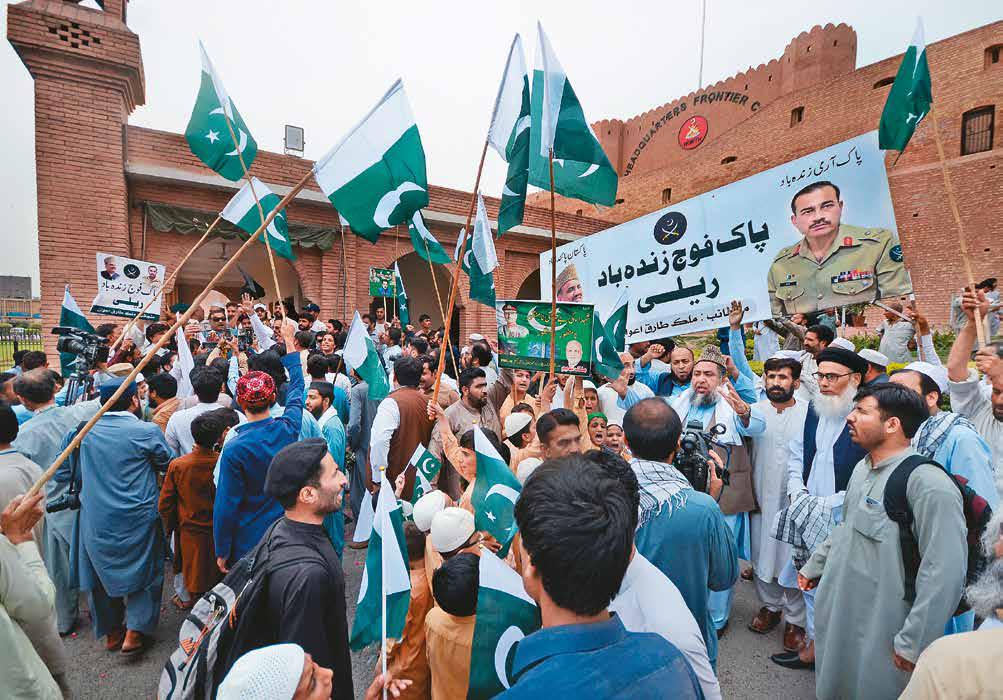
HAVE there been times when civil-military relations in India were so strained that a military coup was -justified? asks Aditya Sondhi, a senior advocate practising at the Supreme Court and the Karnataka High Court, in his new book Poles Apart: The Military and Democracy in India and Pakistan. Sondhi's book is a timely addition to the existing literature on civil-military relations in South Asia. It compares the roles the military has played in India and Pakistan and their impact on the arc of democracy in both countries. It also devotes a chapter to Bangladesh currently in the grip of a historic political churning-and the country's tryst with both democracy and military rule. Poles Apart evolved from Sondhi's research for his PhD thesis, which focused on the interface between the military and democracy in India and Pakistan during 1947-2008. The road from thesis to book was paved with revisions, updates, and a chapter on post-2008 developments.
Some of the pertinent questions Poles Apart raises and investigates are: Is there a connection between the "non-event" of a coup and the growth of democracy? Why has Pakistan been under military rule for long periods and how has this affected the survival of democracy? How did the Pakistani military get actively involved in politics and why does it wield so much influence in the country’s political space?
In the book’s well-crafted Introduction, Sondhi reminds readers that democracy is a complex business and nation states, unique. In this context, comparative politics may be a “theory in transition”, but it definitely has its uses. An analysis of similar institutions in India and Pakistan such as the judiciary, the bureaucracy, political parties, the electoral process, the culture and belief systems, and the role of the military and the extent of its intervention helps to gauge the “health of democracy” in the two countries.
هذه القصة مأخوذة من طبعة September 21, 2024 من Outlook.
ابدأ النسخة التجريبية المجانية من Magzter GOLD لمدة 7 أيام للوصول إلى آلاف القصص المتميزة المنسقة وأكثر من 9,000 مجلة وصحيفة.
بالفعل مشترك ? تسجيل الدخول
هذه القصة مأخوذة من طبعة September 21, 2024 من Outlook.
ابدأ النسخة التجريبية المجانية من Magzter GOLD لمدة 7 أيام للوصول إلى آلاف القصص المتميزة المنسقة وأكثر من 9,000 مجلة وصحيفة.
بالفعل مشترك? تسجيل الدخول

Soft Ruins
'Soft Ruins' is a chapter within the long-term ongoing project \"When Spring Never Comes\", an expansive exploration of memory, identity and displacement in the aftermath of exile within contemporary global politics. It reflects on how the journey as an asylum seeker in Europe mirrors the instability and threats of life under dictatorship, amidst rising right-wing movements and shifting power dynamics, where both certainty and identity are redefined

Building Beyond Homes: Provident Housing's Transformative Approach
Provident Housing leads in crafting thoughtfully designed homes that cater to modern homebuyers' evolving needs. With a focus on timely delivery, sustainability, and innovative, customer-centric solutions, the company sets new benchmarks. In this exclusive interview, Mallanna Sasalu, CEO of Provident Housing, shares insights into the company's strategies, upcoming projects, and vision for India's housing future.

Syria Speaks
A Syrian graffiti artist-activist's tale of living through bombings, gunshots and displacement

The Burdened
Yemen, once a beautiful land identified with the Queen of Sheba, is now one of the worst ongoing humanitarian disasters of modern times

Sculpting In Time
Documentaries such as Intercepted and Songs of Slow Burning Earth grapple with the Russian occupation beyond displays of desolation

The Story Won't Die
Is Israel's triumphalism over its land grab in Syria realistic? The hard reality is-Israel now has Al-Qaeda as a next-door neighbour

Against the Loveless World
In times of war, love exists as a profound act of defiance

Soul of My Soul
What does it mean to continue to create art during a genocide?

in Dancing the Glory of Monsters
By humanising the stories of those affected by war, poverty and displacement, Buuma hopes to foster empathy and inspire action

All the President's Men
Co-author of All The President's Men and one of the two Washington Post journalists (the other was Carl Berntstein) who broke the Watergate scandal that brought down the President Richard Nixon administration in the United States in 1974, Bob Woodward's recent book War was on top of The New York Times Bestseller list, even above John Grisham.